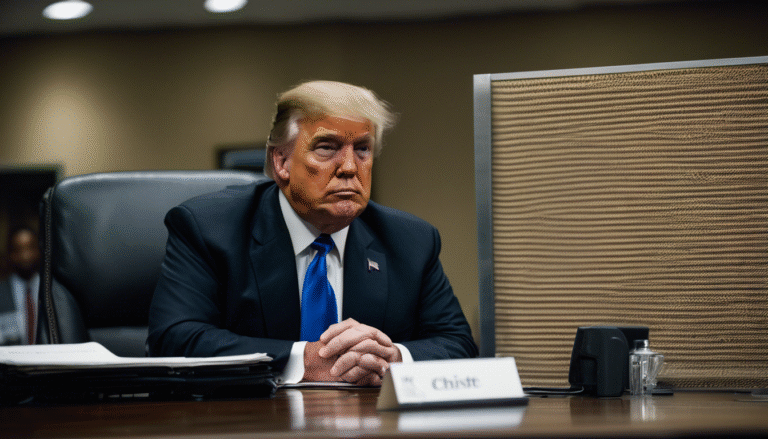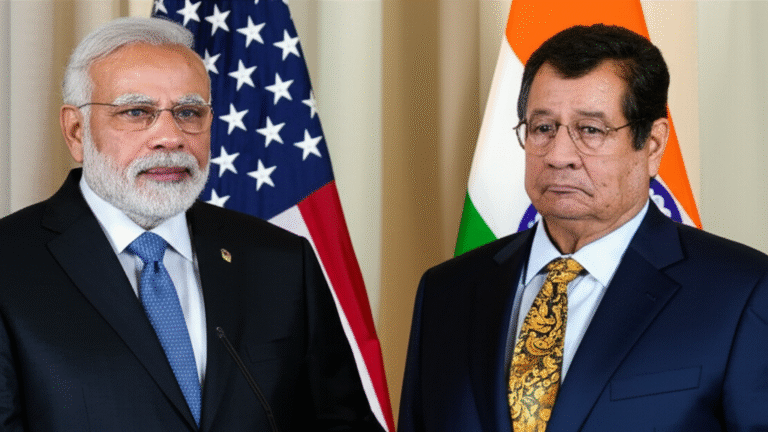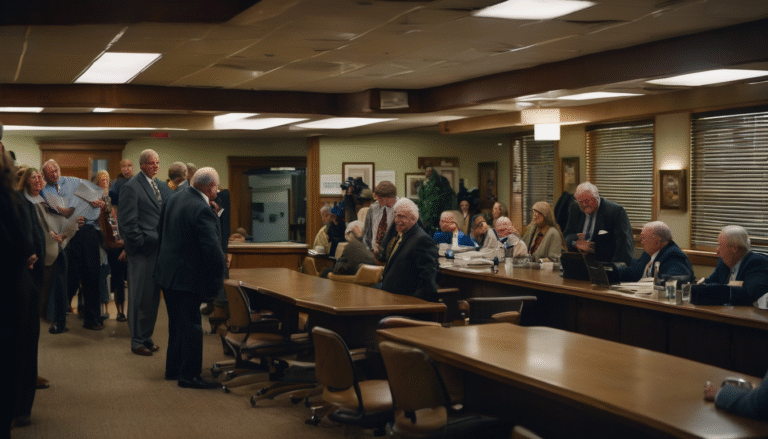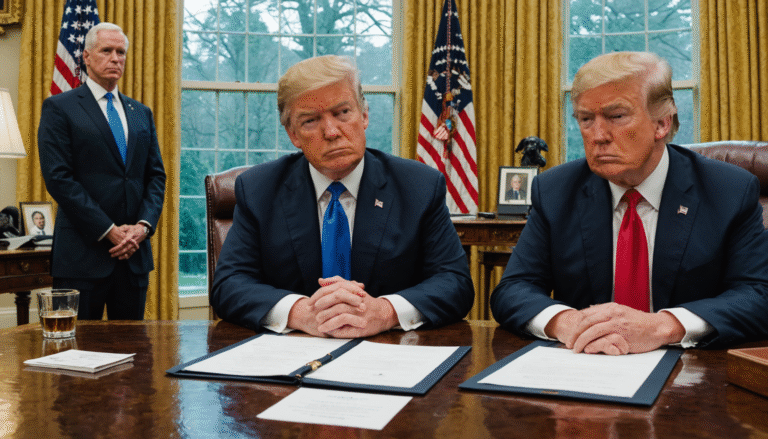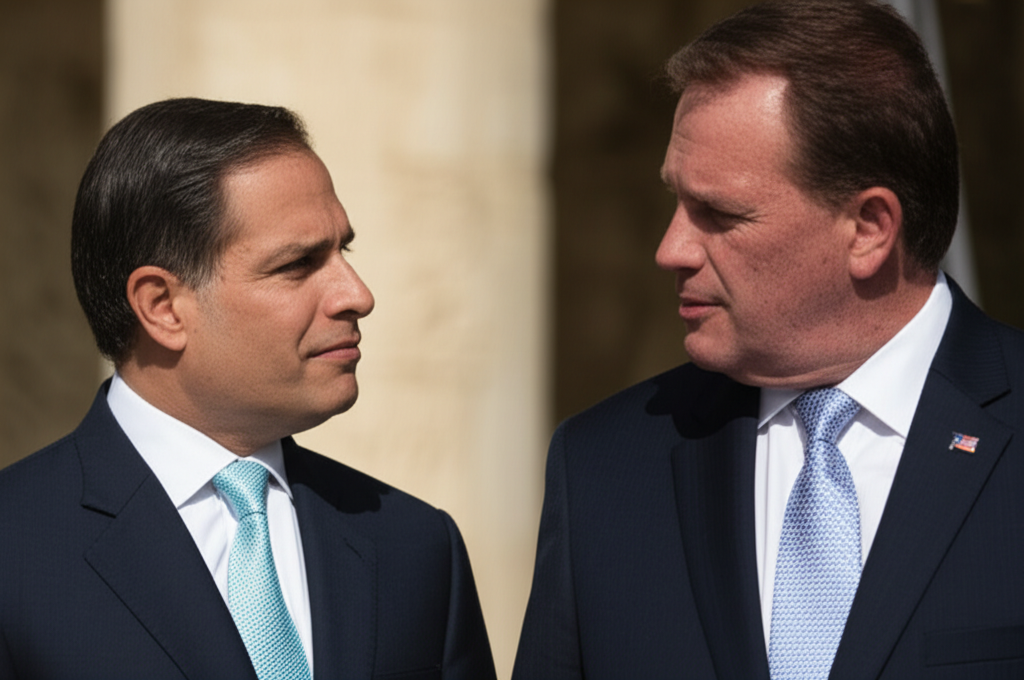
US Secretary of State Marco Rubio, during a visit to Jerusalem, expressed strong backing for Israel’s ongoing offensive on Gaza City and its stated objective of eradicating Hamas. This firm stance on Rubio Israel Hamas relations underscored a lack of discernible difference between the US official’s views and those of Prime Minister Benjamin Netanyahu. The visit, occurring at a critical juncture, highlighted enduring US support for Israel amid renewed military actions and skepticism regarding diplomatic resolutions. Rubio’s presence in Jerusalem served to reinforce a message of solidarity, even as nuances in statements from President Donald Trump had emerged previously concerning Israeli operations.

During a joint press conference with Prime Minister Netanyahu, Secretary Rubio conveyed a clear position on the future of Gaza. He asserted that a better future for the people of Gaza is contingent upon the elimination of Hamas. This direct statement reiterated the United States’ firm alignment with Israel’s primary strategic goal in the conflict. Rubio unequivocally stated, “You can count on our unwavering support,” emphasizing the consistent backing from the United States for Israel’s efforts.
Rubio, Israel, and the Goal to Eradicate Hamas
Secretary Rubio also voiced a skeptical outlook on the ongoing Qatari-brokered negotiations aimed at securing a ceasefire. This skepticism was articulated despite President Trump having previously predicted, just a month earlier, that the conflict could conclude within weeks. Rubio characterized Hamas, the group whose unprecedented October 7, 2023, attack on Israel initiated the extensive military response, as “barbaric animals.” He further elaborated on the challenging nature of finding a resolution to the conflict, indicating a realistic assessment of the situation.
Addressing the feasibility of a peaceful end to the hostilities, Rubio noted the desire for diplomatic solutions while acknowledging potential limitations. He stated: “As much as we may wish that there be a sort of a peaceful, diplomatic way to end it, and we’ll continue to explore and be dedicated to it, we also have to be prepared for the possibility that that’s not going to happen.” This perspective underscored a readiness for prolonged engagement if diplomatic avenues prove insufficient.
The people of Gaza deserve a better future, but that better future cannot begin until Hamas is eliminated.
Israel has initiated a significant new military campaign with the explicit aim of seizing Gaza City, which stands as the largest urban center within the territory. This offensive is unfolding in a region where the United Nations last month determined that a million people were facing famine, a finding that Israel has since rejected. Civilian casualties continue to be reported, with the civil defense agency indicating that Israeli strikes on one Monday resulted in the deaths of 42 additional people, many of whom were in Gaza City. Due to media restrictions in Gaza and challenges in accessing many areas, independent verification of details provided by both the civil defense agency and the Israeli military remains difficult for international news organizations.
Prime Minister Netanyahu characterized Rubio’s visit as a “clear message” affirming the United States’ steadfast support for Israel. Netanyahu further lauded President Trump, referring to him as “the greatest friend that Israel has ever had,” underscoring the perceived strong relationship between the two nations’ leaderships.
International Perspectives and Palestinian Statehood
Secretary Rubio was scheduled to travel to Qatar following his visit to Jerusalem. Qatar hosts the largest US air base in the region and has actively sought to foster strong relations with President Trump, including presenting a gift of a luxury plane. Simultaneously, Qatar convened a summit of Arab nations where its emir, Sheikh Tamim bin Hamad Al Thani, offered a critical assessment of Israel’s approach to negotiations. The emir suggested that Israel viewed negotiations as merely a component of its broader war strategy. Sheikh Tamim commented on the apparent contradiction of engaging in negotiations while simultaneously targeting the negotiating party, stating, “Whoever works diligently and systematically to assassinate the party with whom he is negotiating intends to thwart the negotiations.”
Rubio’s visit also occurred a week before France is set to lead a United Nations summit. At this upcoming summit, several US allies, reportedly angered by what they perceive as Israeli intransigence, plan to recognize a Palestinian state. Such recognition is fervently opposed by Prime Minister Netanyahu’s right-wing government. Rubio dismissed the recognition of Palestinian statehood as “largely symbolic” and contended that such actions paradoxically “emboldened” Hamas to maintain a hardline stance. He further argued that these efforts were “actually hurting the cause they think they’re furthering,” implying that they are counterproductive to peace.

In response to the prospect of Palestinian state recognition, Prime Minister Netanyahu issued a warning that Israel might undertake unspecified unilateral action. This warning comes amidst calls from far-right members of Netanyahu’s cabinet for the annexation of the West Bank, a move that would effectively preclude the establishment of a Palestinian state. These annexation proposals have prompted protests from the United Arab Emirates, a nation that took the landmark step of recognizing Israel five years prior to Rubio’s visit.
Symbolic Gestures and Local Discontent
Secretary Rubio commenced his visit on a Sunday with a highly symbolic display of support for Israel. He joined Prime Minister Netanyahu at the Western Wall, a site considered the holiest place where Jews are permitted to pray. Subsequently, Rubio, a devout Catholic, posted about his visit, expressing his conviction that Jerusalem is the “eternal capital” of Israel. This public declaration marked a notable shift from the policies of US leaders prior to Trump’s first term, who had generally avoided such overt statements endorsing Israeli sovereignty over contested Jerusalem, a city also considered holy by Muslims and Christians.
Later on Monday, Rubio was scheduled to attend the inauguration of a tunnel designed for religious tourists. This tunnel extends underneath the Palestinian neighborhood of Silwan to connect with holy sites, highlighting a sensitive point of contention in the region. Fakhri Abu Diab, a 63-year-old community spokesman in Silwan, offered a starkly different perspective. He suggested that Rubio should instead visit homes, including his own, that Palestinians charge have been demolished by Israel as part of a targeted campaign to displace them. Abu Diab criticized US policy, stating, “Instead of siding with international law, the United States is going the way of extremists and the far right and ignoring our history.” In response, Rubio downplayed the political implications of the tunnel, referring to it as simply “one of the most important archaeological sites in the world.”
- US Secretary of State Marco Rubio backed Israel’s Gaza City offensive and its goal of eradicating Hamas.
- Rubio expressed skepticism regarding the efficacy of Qatari-brokered ceasefire negotiations.
- Israel has initiated a significant new military campaign focused on seizing Gaza City.
- A week before a French-led UN summit, US allies plan to recognize a Palestinian state.
- Rubio visited the Western Wall and attended a tunnel inauguration in Jerusalem.
Background
The current extensive military response by Israel was triggered by an unprecedented attack on October 7, 2023, carried out by Hamas. This attack resulted in the deaths of 1,219 people, the majority of whom were civilians, according to an AFP tally compiled from official figures. In retaliation, Israel launched a campaign in Gaza that has led to the deaths of more than 64,900 people, also mostly civilians, according to figures provided by the health ministry that the United Nations deems reliable. Earlier, President Donald Trump had gently chided Israel for conducting air strikes on Hamas leaders in US partner Qatar, indicating a past point of divergence. Furthermore, the United Arab Emirates, which recognized Israel five years ago in a landmark move, has lodged protests against recent calls from far-right members of Netanyahu’s cabinet for the annexation of the West Bank, underscoring evolving regional dynamics.
What’s Next
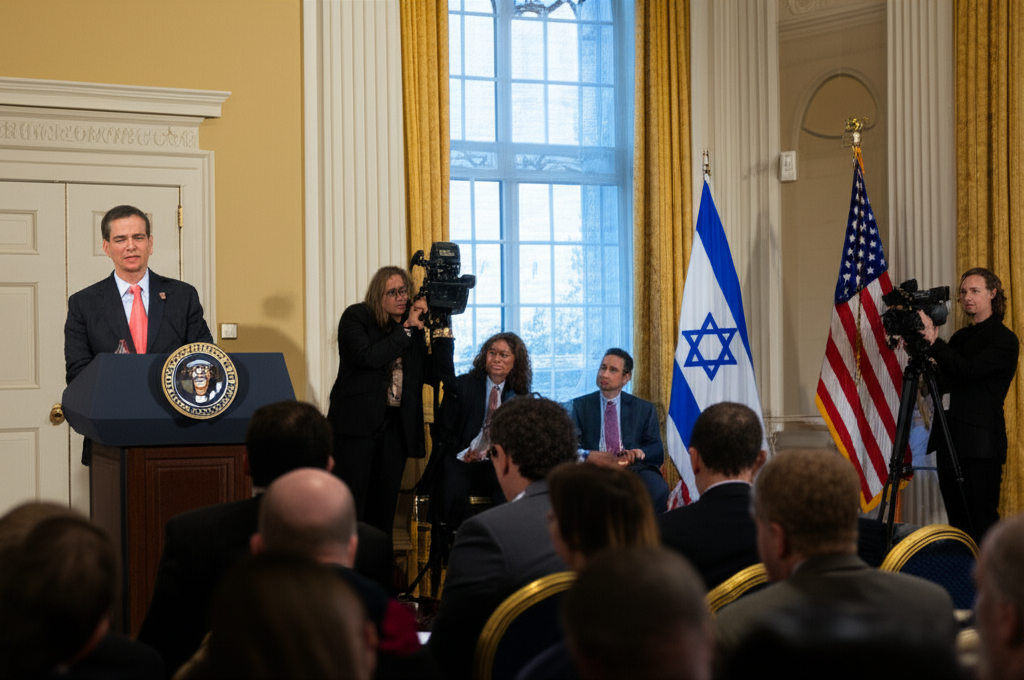
Secretary Rubio’s itinerary included travel to Qatar on the Tuesday immediately following his visit to Jerusalem, indicating continued engagement in the region. A significant diplomatic event is slated for the following week: a French-led United Nations summit. At this summit, several US allies, reportedly frustrated by what they perceive as Israeli intransigence, intend to proceed with the recognition of a Palestinian state. In anticipation of such recognition, Prime Minister Netanyahu has issued a warning that Israel may undertake unspecified unilateral actions in response. Despite the skepticism expressed by Rubio regarding the immediate prospects for a peaceful resolution, he also indicated that exploration and dedication to diplomatic solutions would continue.
This ongoing situation in the region, encompassing military actions, diplomatic maneuvering, and humanitarian concerns, remains a focal point for international attention. The visit by Secretary Rubio and the ensuing discussions underscore the complexities of achieving a lasting peace in the context of the Rubio Israel Hamas conflict. [Source]

